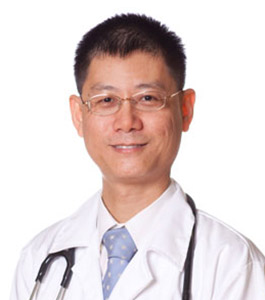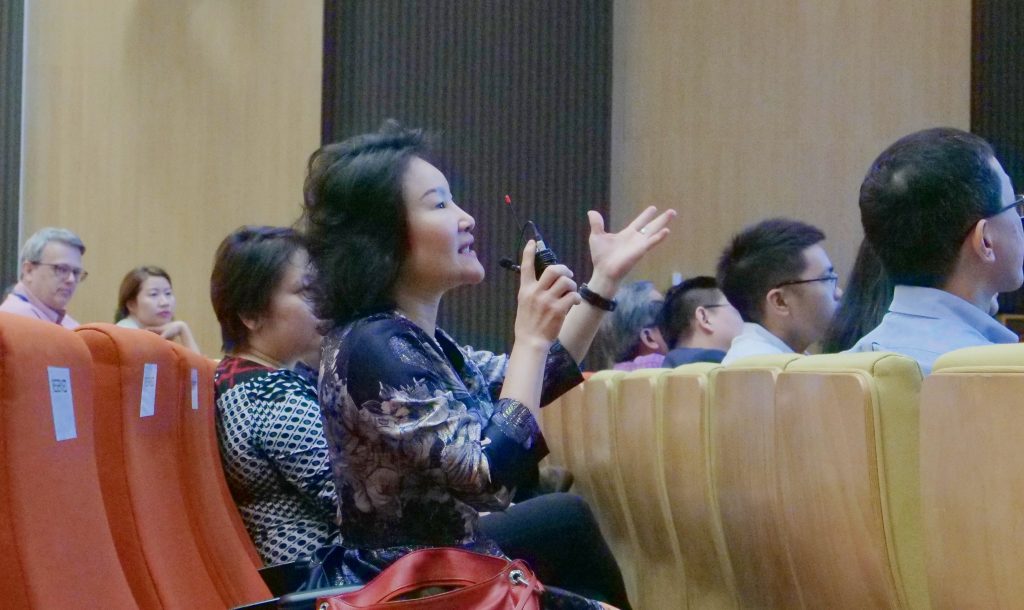NUS Medicine Educators’ Day

It’s a thumbs up from Dean, Prof Chong Yap Seng (third from left), Vice-Dean for Education, A/Prof Lau Tang Ching (right), and speakers (from left to right) Dr Lionel Cheng, Dr Nigel Fong, A/Prof Nga Min En and A/Prof Liaw Sok Ying
By Education Division
September is the month when we celebrate teachers and the critical role that they play in training and nurturing our students. The inaugural NUS Medicine Educators’ Day served as a platform for educators to share their ideas and best practices to enhance medical teaching, as we brought them together on the morning of 14 September 2019 to express our appreciation for them.
In NUS Medicine, every one teaches.
Our best teachers revolutionise learning.
Our best researchers reconceptualise understanding.
Our best doers transform healthcare.
Together, we inspire health.– Prof Chong Yap Seng
Dean, from his opening address
In his welcome address, Professor Chong Yap Seng, Dean of the Yong Loo Lin School of Medicine, highlighted that education is the primary focus of the School, and that the role of educators is evolving to extend beyond traditional teaching roles. Educators would also play leadership roles in curriculum development and demonstrate scholarship by education-focused publications. Importantly, educators are key to driving innovation in education, as they are best placed to successfully apply new technology and approaches to increase teaching effectiveness and meet changing learners’ needs.
A/Prof Liaw Sok Ying of the NUS Alice Lee Centre for Nursing Studies presented her work on a simulation-based programme for inter-professional education, CREATIVE (Create Real-life Experience and Teamwork in Virtual Environment). Working in teams, students interact with one another and their “patients” using animated avatars. They use real-life scenarios such as bedside rounds to practise applying their clinical knowledge and develop their communication skills, following which there is a debrief to provide feedback that further enhances learning.
Showcasing another example, A/Prof Nga Min En from the NUS Medicine Department of Pathology spoke about Pathweb, an online resource to facilitate the teaching of pathology in a manner that is practical and clinically focused. Pathweb includes a virtual pathology museum with interactive, three-dimensional pathology specimens linked to clinical vignettes, radiologic images and microscopic correlates. There is also an open access resource for the teaching of general and systemic pathology, which includes video mind maps, quizzes and interactive pots and slides. A “Radiopath Museum” is currently being developed, which will focus on the structures of abnormal organs, including gross pathology and diagnostic imaging.

A/Prof Tay Sook Muay takes the floor with a question at the Q&A session
On the clinical front, Dr Lionel Cheng from the radiology department at Singapore General Hospital (SGH) shared more about the various initiatives and approaches used to enhance education in this field. Interactive workshops using a game show format have been very well received by students who are able to better focus and retain their knowledge. Using case-based discussions also ensured a high level of clinical relevance that successfully reinforced key learning points. In a pilot session, final year students also underwent a combined surgery-radiology interactive tutorial which better integrated teaching across different specialties and illustrated inter-disciplinary collaboration.
In addition, Dr Cheng experimented to see how different types of technology could support his teaching. He customised his teaching content with an online real-time audience response system and also tested the use of Google Classroom as a hosting site for teaching material and quizzes.
Learning certainly goes on after medical school. Highlighting an effort to enhance education through experiential learning and guided reflection, Dr Nigel Fong from Singapore General Hospital outlined Project HOpe (House Officer preparation exercise), an initiative by SingHealth internal medicine residents to support house officers in the SingHealth Medicine departments and to ease their transition into clinical practice. As part of the training, HOs receive an on-call handbook and attend a half-day workshop to improve their clinical care and facilitate experiential learning from night calls, through feedback and guided reflection exercises. Project HOpe also includes a feedback system to facilitate the communication of formative feedback from on-call medical officers to the house officers. There are plans for such near-peer support to extend to near- peer mentorship and to provide structured reflection sessions
